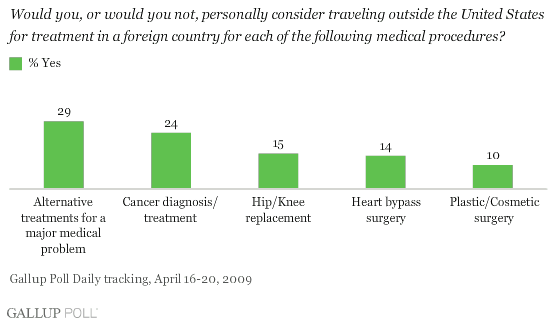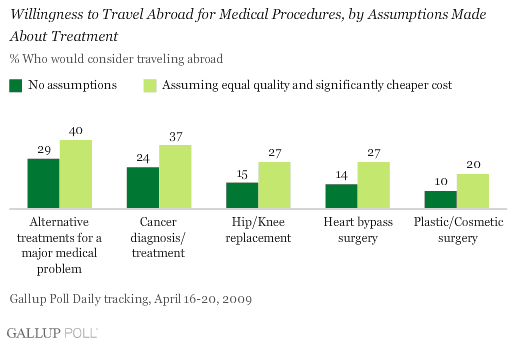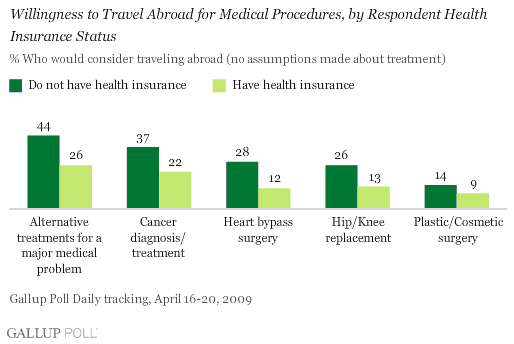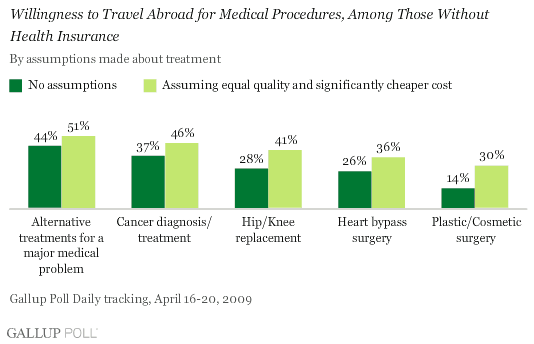WASHINGTON, D.C. -- While domestic healthcare costs are expected to increase to an estimated 21% of GDP by 2010, some Americans may be interested in taking their healthcare spending elsewhere. A recent Gallup Poll finds that up to 29% of Americans would consider traveling abroad for medical procedures such as heart bypass surgery, hip or knee replacement, plastic surgery, cancer diagnosis and treatment, or alternative medical care, even though all are routinely done in the United States.

Have Ailments, Will Travel
Medical travel, categorized as inbound (from other countries to the U.S.) and outbound (to other countries from the U.S.), was originally a luxury afforded to the rich -- particularly those inbound to the United States and European countries for treatment at world-class facilities. Yet the increasing cost of medical care in the United States and large numbers of uninsured (at least 48 million people, according to the Kaiser Commission on Medicaid and the Uninsured) may be making outbound travel an option worth considering.
Gallup finds that sizable proportions of Americans would "consider traveling outside the United States for treatment in a foreign country" for a variety of procedures and medical treatments. Twenty-nine percent of respondents would consider traveling out of the U.S. for alternative medical treatments for a major medical problem, and 24% would seek cancer diagnosis and treatment abroad. Americans are less likely to say they would consider traveling abroad for orthopedic procedures (15%), heart treatment (14%), or elective cosmetic surgery (10%).
Can't Pass Up a Good Bargain
The poll of 5,050 U.S. adults involved a split-sample experiment, in which one random half-sample was asked the "direct" question, reported above, on whether they would consider treatment abroad. The second half was asked whether they would consider treatment abroad, assuming "the quality was the same and the costs significantly cheaper." Given this additional phrasing, the percentage saying they would consider medical treatment outside U.S. borders increased by 12 percentage points, on average.

Across regions, respondents in the Midwest are consistently the least willing to consider obtaining treatments outside the country, whereas respondents in the West are consistently the most willing. Southerners are also below average in their willingness to obtain treatments outside the country, with the exception of hip or knee replacement.
Healthcare coverage is an important factor in the likelihood that Americans would consider getting health treatment abroad. Those who report that they don't have health insurance are more likely to consider going abroad for medical treatment. For example, 37% of respondents without health insurance would seek cancer care abroad as compared to 22% with health insurance.

Those without health insurance were on average 11 points more likely to say they would consider treatment abroad if the cost and quality provisions were included in the question than if they were not included.

Bottom Line
A sizable minority of Americans view the healthcare diagnosis and treatment available beyond national borders as something they would consider using. If strides in insurance reimbursements, overseas hospital quality, and affordability continue, it will be an increasingly attractive option for Americans. The data suggest the estimated population of 48 million Americans without health insurance are motivated by costs and would be more likely than those with health insurance coverage to consider seeking medical care from alternative sources.
Survey Methods
Results are based on telephone interviews with 5,050 national adults aged 18 and older, split into samples of 2,524 and 2,572, conducted April 16-20, 2009, as part of Gallup Poll Daily tracking. For results based on these samples of national adults, one can say with 95% confidence that the maximum margin of sampling error is ±2 percentage points.
Interviews are conducted with respondents on land-line telephones (for respondents with a land-line telephone) and cellular phones (for respondents who are cell-phone only).
In addition to sampling error, question wording and practical difficulties in conducting surveys can introduce error or bias into the findings of public opinion polls.
